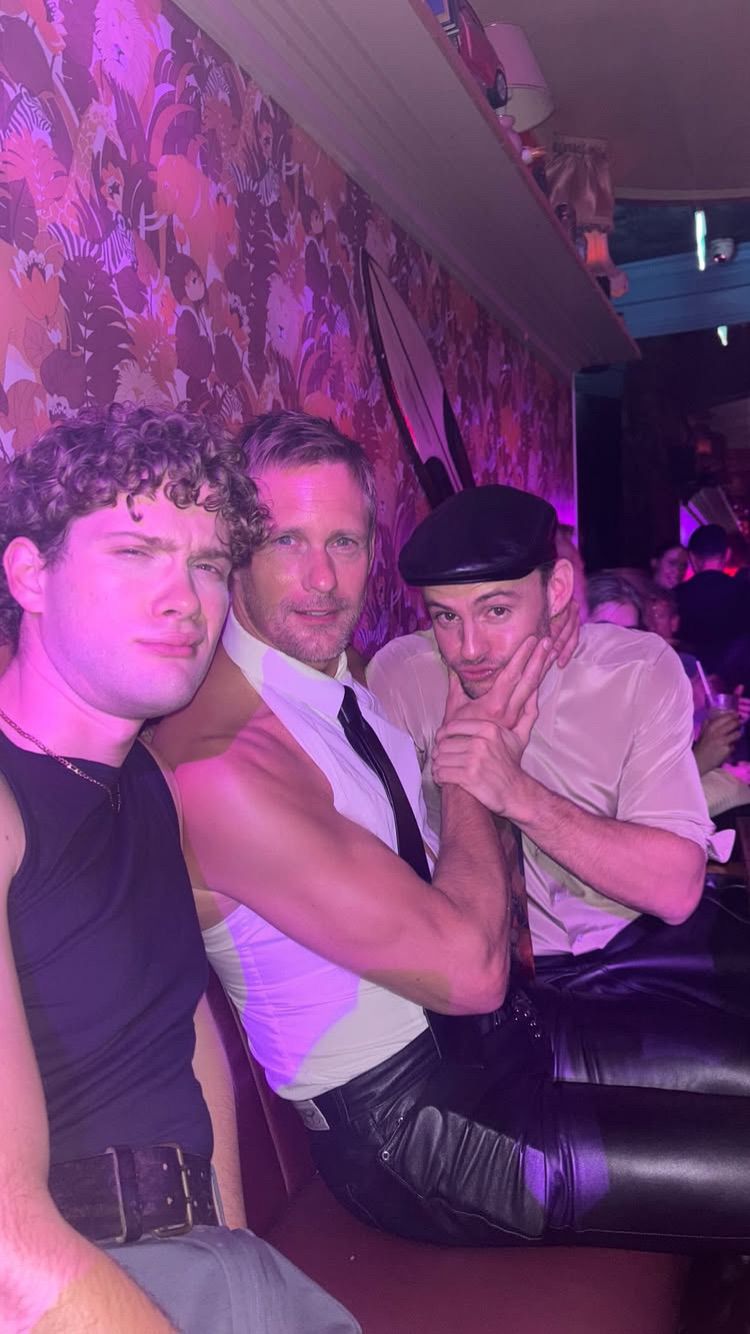
Harry Lighton speaks to comedian and actor Leo Reich about his breakout ‘dom-com’ Pillion, which stars Alexander Skarsgård as biker Ray and Harry Melling as Colin, who enter into a Sub/Dom relationship after a chance encounter at the pub. Lighton and Reich discuss internalised homophobia, why being dominant is like being the coolest kid in the classroom and pinching visuals from Alfonso Cuarón.
Leo Reich: I’m going to set the scene for readers. We’re in the Barbican. I’m wearing a hoodie. Harry is… I don’t know what you call that?
Harry Lighton: A sort of hiking fleece, which Skarsgård’s character Ray wears in the film, if you’ve seen the film. I like to feel close to Skarsgård and Ray. You presumably have never seen me without a cap.
LR: Last time you were wearing a sort of red beret.
HL: I don’t think I’ve not worn a cap in 15 years.
LR: Why is that?
HL: I think that balding is inherently homophobic. So I am confronting homophobia by wearing a cap.
LR: It’s sort of externalized homophobia. Balding. Do you think you are homophobic sometimes?
HL: Is that the question you are asking me straight off the bat?
LR: Sometimes I catch myself being homophobic. Actually when I heard about Pillion for the first time – I’ve seen it twice and I loved it, as I’ve told you…
HL: You said it was your favourite film ever on Letterboxd. I’ve heard.
LR: But when I hear about any gay cinema, particularly with kink, there’s a part of me that thinks it might be gimmicky.
HL: It’s funny, a few people have said that their reaction to hearing about a kinky film is like “eye roll”. I think there’s a feeling that loudly making a film about kink is kind of like loudly declaring that you’re cool. Someone saying “I am at the cutting edge of sexuality,” can be quite annoying. But the idea was that I’d lean into that eye roll by then presenting something that cuts against the “coolness” of kink and try to do something that shows the soft underbelly that sits alongside the hard surface.
LR: That feels in some way to be what the film is about. We see a relationship that has very defined roles and there’s a level of performance there that can feel quite detached maybe – or “cool”. The Skasgard character and his cool suit and his cool voice. He’s cool. And the film sort of exposes a vulnerability in him.
HL: Ultimately being cool is a performance right? No one can live in a role all the time. So if you spend 24 hours a day with someone, you’re gonna see them wearing their nasty fifth-best t-shirt, which makes them inherently less cool than when they’re in bike leathers. Or you’re gonna, you know, hear them shart after eating too much Mac and cheese. I think being “dominant”, in the two-dimensional sense, is kind of similar to being the coolest kid in the classroom.
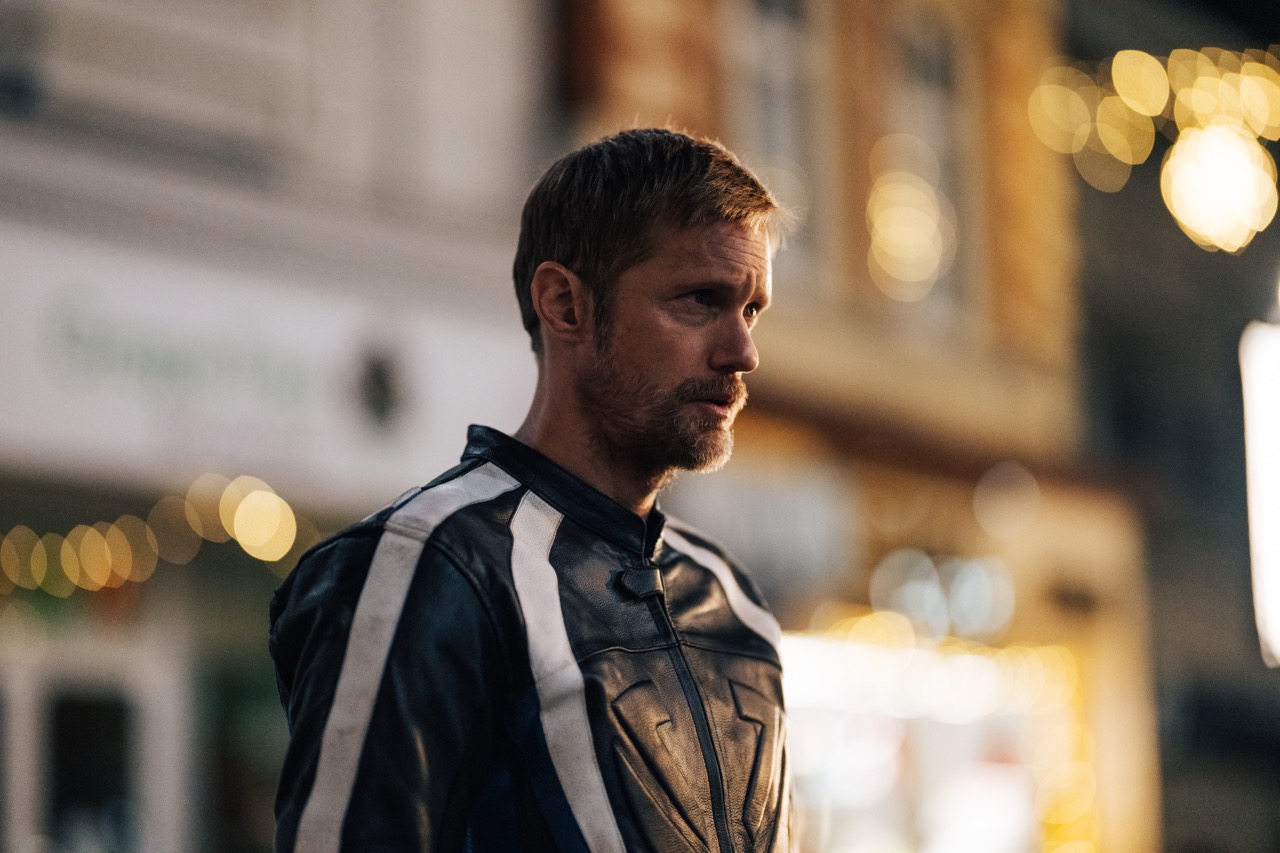

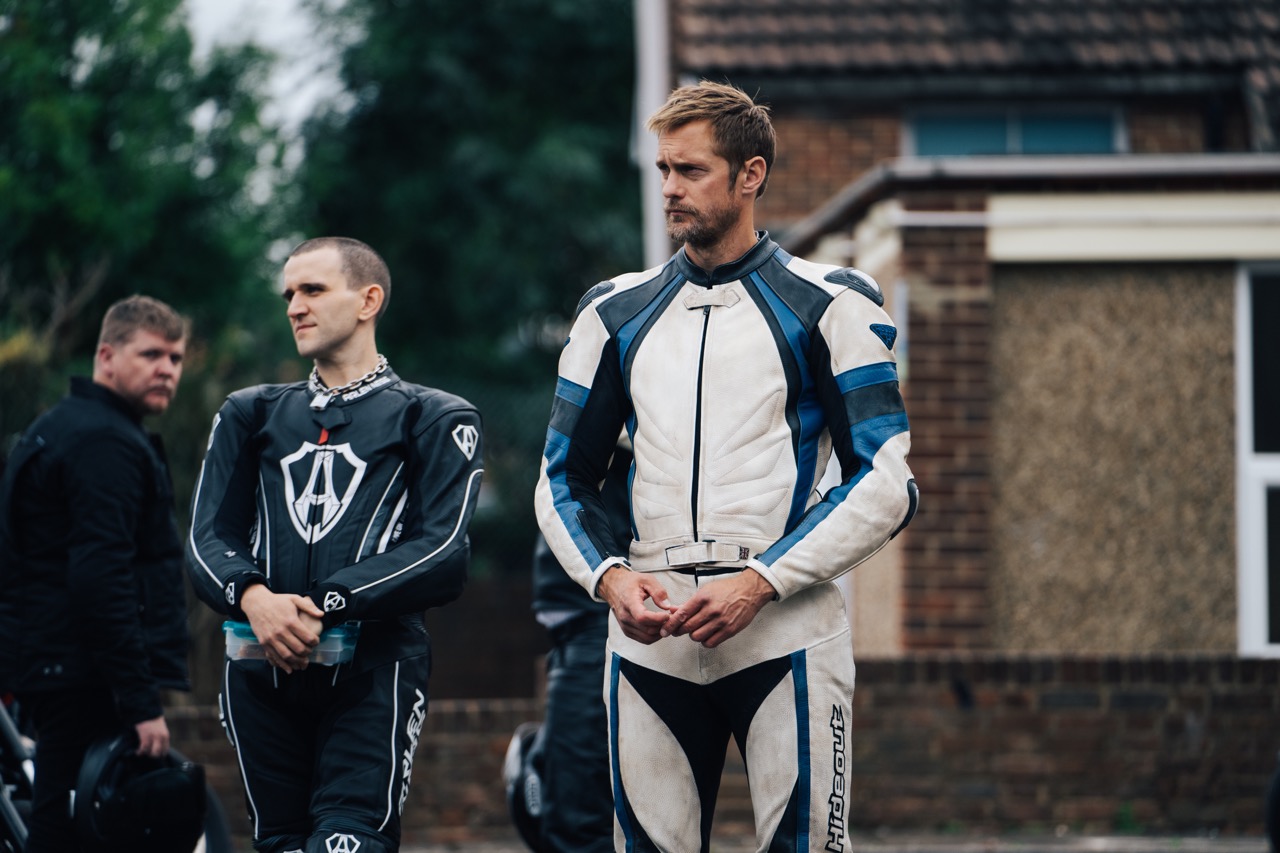
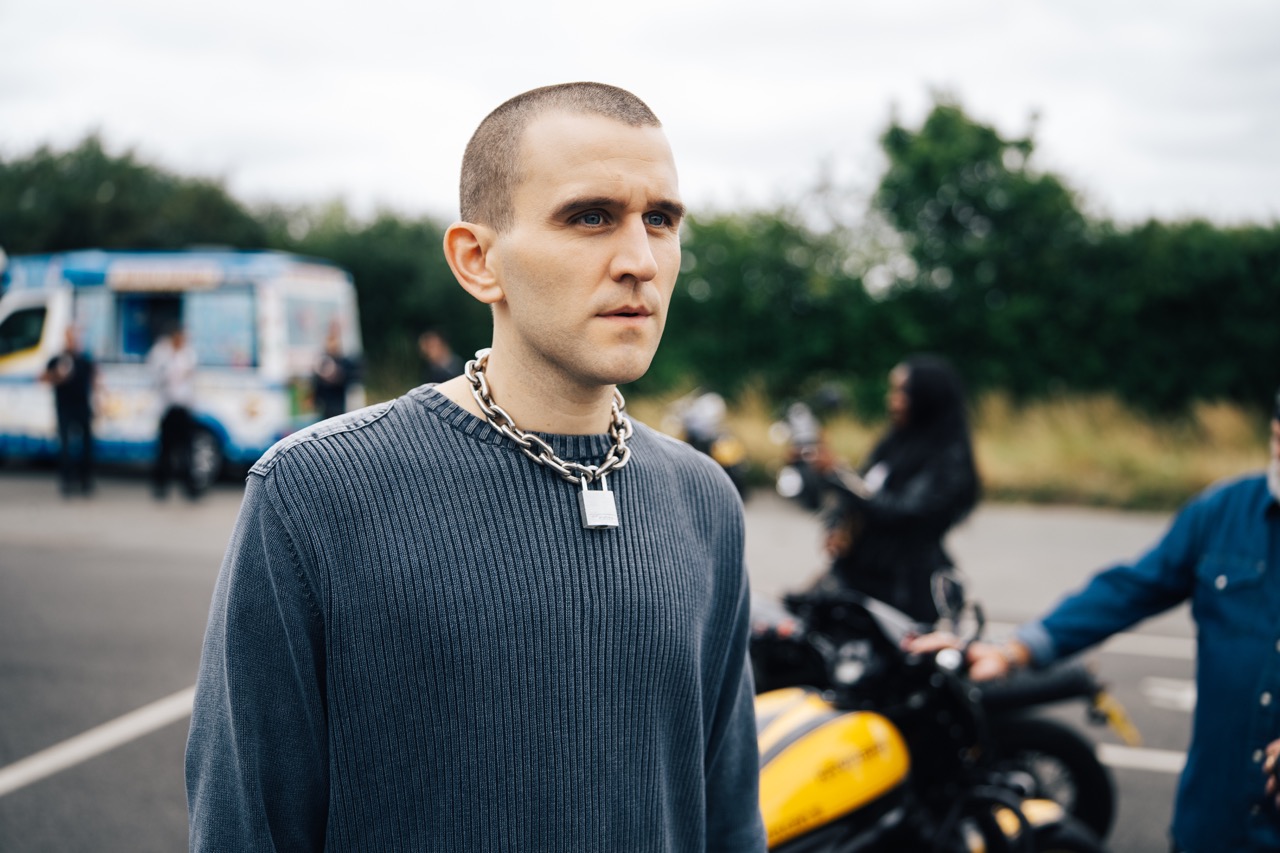
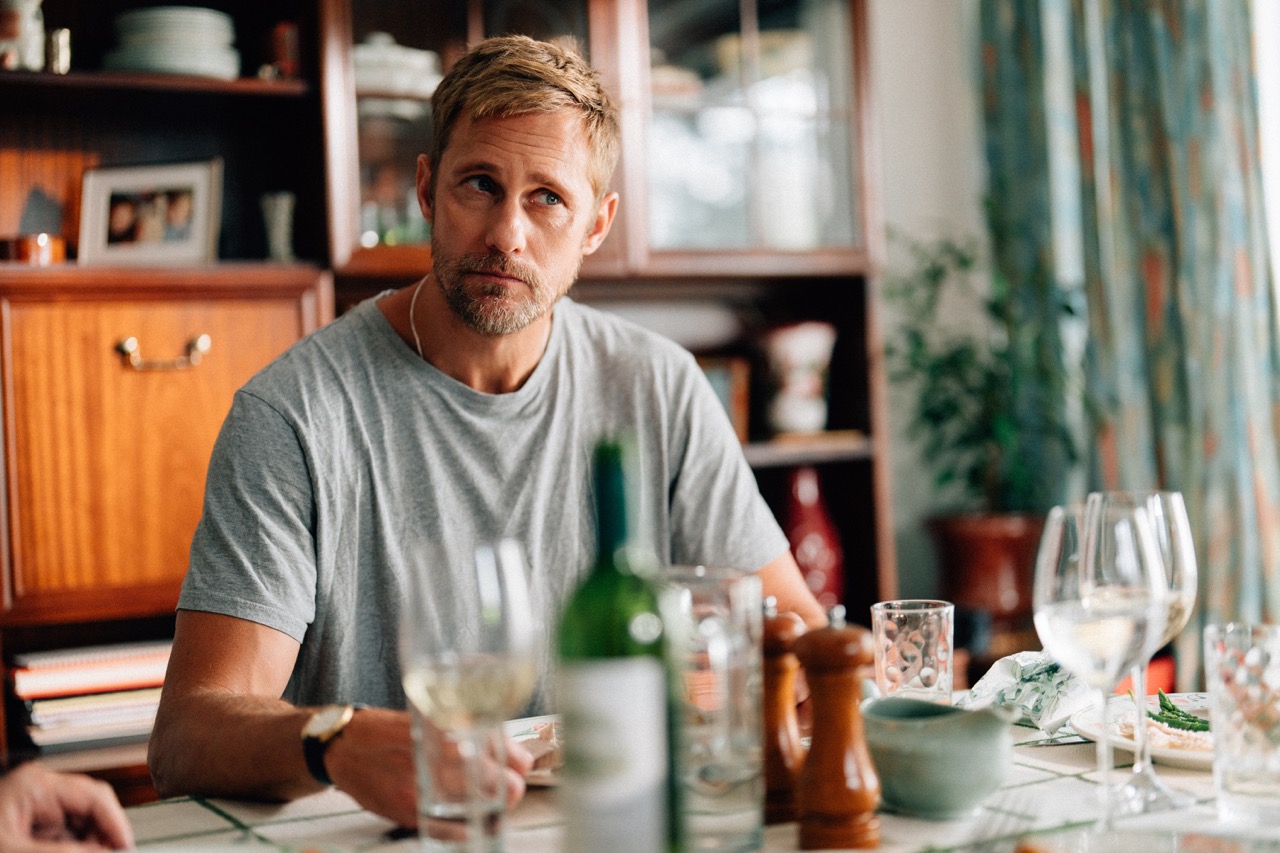
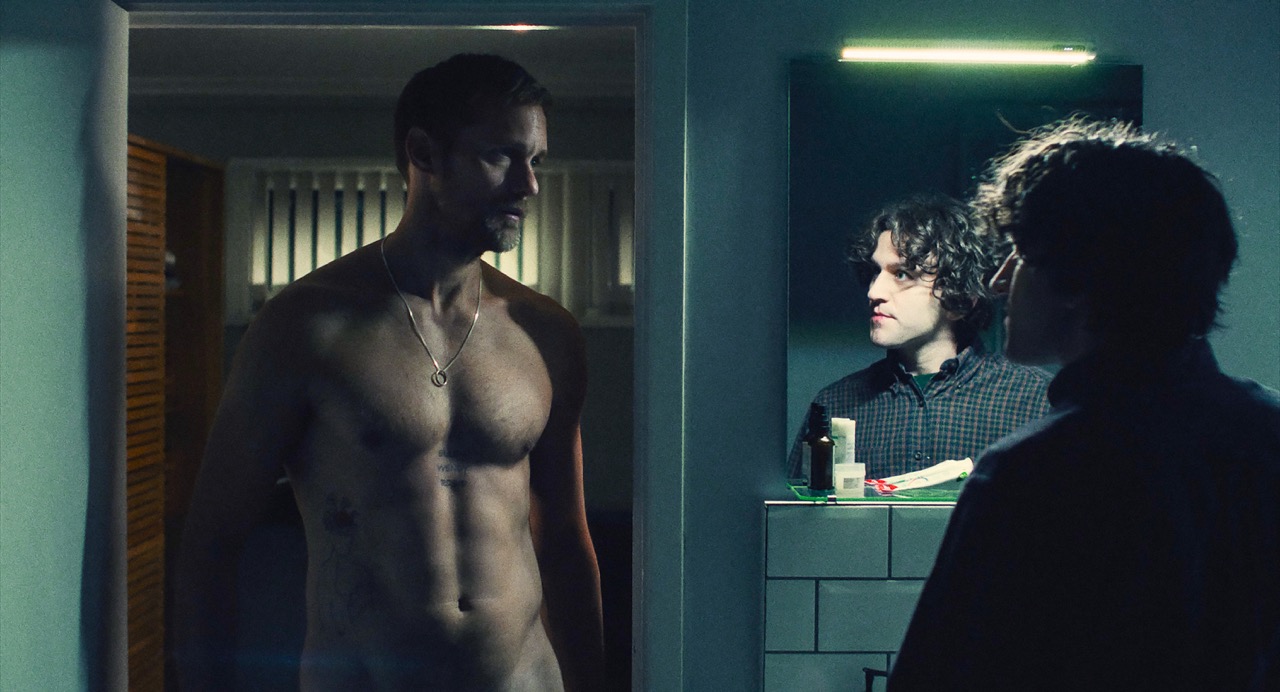
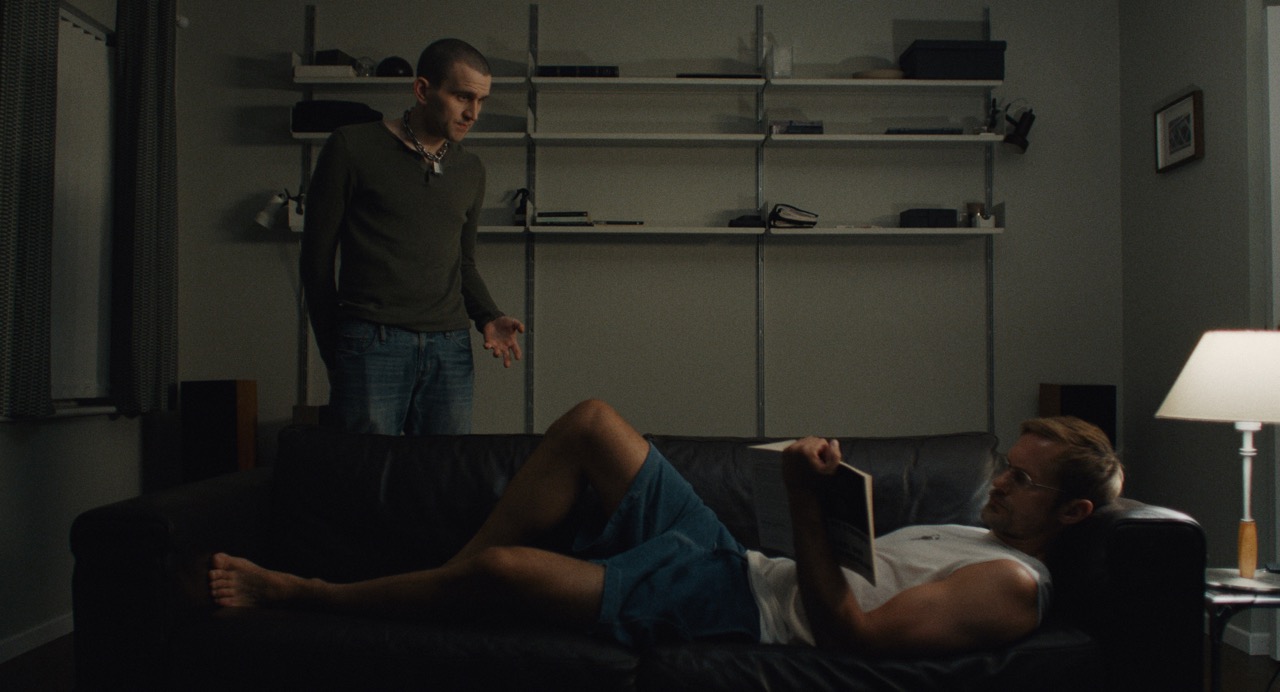
LR: I guess I was surprised at how sentimental I found it. You really pull against any preconception of what can be viewed as quite a violent—or at least left-field—sexual relationship. It’s interesting how traditional or recognizable the emotional conflicts that they have as a couple are—or how traditionally poetic or soppy some of the conversations they have about love and feelings are. Was that an intentional juxtaposition?
HL: I think Colin enters the film and the relationship with quite traditional romantic ideals which have been built around the 10 steps of a relationship, which at some point must include a soppy conversation around love. I was interested in putting that into the context of this relationship and seeing where it felt awkward or where it actually sat quite neatly. In that specific conversation about love, there’s a cliche, it’s paraphrasing Rumi, that love is the whole point of everything. I quite liked the idea of having an incredibly trite statement about love applied to a relationship which a lot of audience members won’t recognize. And in that moment, hopefully they’ll think oh, well, I’ve said a version of those words before but in a very different relationship context. I think it makes it harder for them to kind of disavow what they’re seeing on screen as totally alien. Wait, did you say sentimental? That’s quite a loaded word. Can you change it? Please? Soppy?
LR: Yeah, sure, soppy.
HL: I like soppy… how would you define sentimental?
LR: Well to me I think it’s positive. I like things to be sentimental. I cried both times I watched Pillion.
HL: I’ve never cried watching a film.
LR: What?
HL: I’ve cried once in the past 10 years, I don’t have that facility. When you asked me at the beginning if I’m homophobic, that’s my answer. My homophobia presents itself in my, like, war against tears.
LR: Harry, that is absolutely psychotic. Where was I? Ok. In the way you shoot things, even moving between Colin’s house and Ray’s house, there is a level of romance or nostalgia. Maybe that’s a better word than sentimental.
HL: No, that totally tracks. With Colin’s home, I wanted to lean into that kind of fuzzy family Christmas feeling. And for Ray’s house the opposite – stark and cold.
LR: Did you have real spaces in mind that you drew on for those locations?
HL: Mostly my own memories of Christmas. Me and my DoP Nick Morris were also inspired by photographer Nick Waplington, especially his book Living Room, where he shoots tightly framed, crowded scenes full of rust-red and faded-green tones. I used to describe the Smiths’ house as “Christmas past its sell-by date.” – noisy, cramped and off-colour. I wanted that contrast: the chaotic, suffocating Christmas atmosphere, then the shift to Colin’s new space, which feels open but also blank and stripped of personality.
Someone saying “I am at the cutting edge of sexuality,” can be quite annoying. But the idea was that I’d lean into that eye roll by then presenting something that cuts against the “coolness” of kink and try to do something honest with it.
Harry Lighton
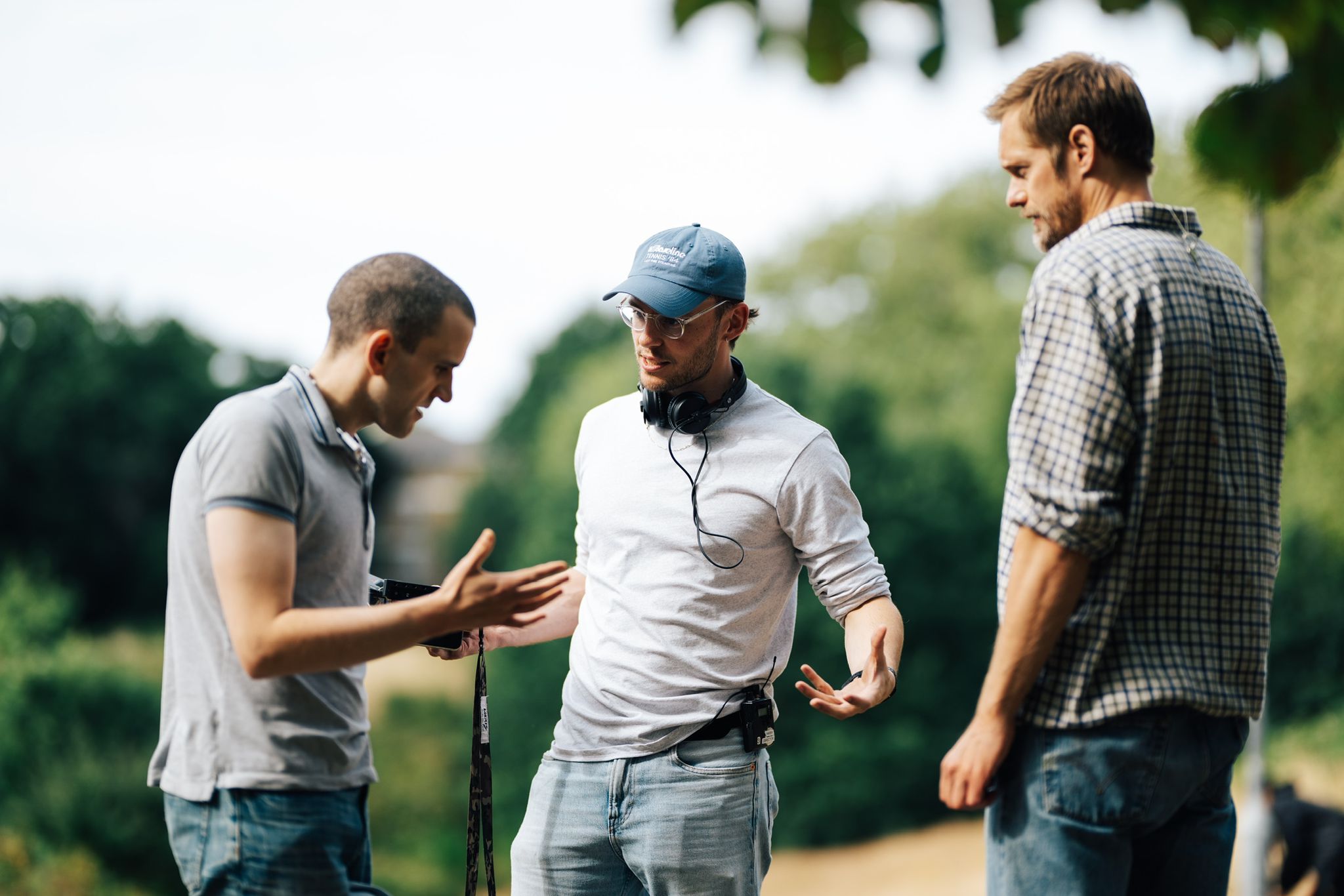
Harry Melling, Harry Lighton and Alexander Skarsgard on set of Pillion (2025).
LR: You were saying that Colin’s approach to love is a bit more traditional. It almost felt like he was from the past in some ways. Whereas Ray’s house looks almost like a porn set. It looked like you could wipe down all the surfaces quite easily.
HL: We actually discussed what sofa Ray would have if people were going to jizz on it all the time. That was an actual conversation I had with my production designer. In the way he moves through the world, Colin feels like someone who exists in a previous century and a straighter world, I think, than contemporary London.
LR: Did you think about that a lot while you’re making it, sort of locating it in the world? In contemporary queer culture? Or was it more like a parable?
HL: I thought a lot about how to represent the community in the film. I drew on people’s experiences, cast real bikers and kinksters, and interviewed lots of people in Sub/Dom relationships so the community could actively shape its portrayal. In writing, I do think I reacted against the tropes in queer cinema that I felt I was bored of. One being, I guess, the familiar journey from parental rejection to acceptance. I thought it would be more interesting to flip that and to start with very permissive, liberal parents who later reject someone because his queerness doesn’t fit their idea of acceptable queerness. That contrast lets the film explore how different forms of queerness relate to the more mainstream, widely accepted versions.
LR: The straight version, I guess. Going in, I didn’t know that Pillion was an adaptation. And finding that out after watching the film surprised me, I think because when a film explores the guts of a relationship in such a vulnerable, detailed way, you tend to assume it comes from one person’s worldview or experience. I should say, I haven’t read the book.
HL: You haven’t read the book? Shame on you. It’s 60 pages as well. It’s a novella.
LR: See, I didn’t even know that. It’s 60 pages?
HL: You could have read it on the way here. You would have had a better question than something wish-washy about the adaptation process.
LR: Right, yeah… So, how faithful were you to the original text in the adaptation process?
HL: Not faithful. There’s a similarity of tone in the book and in the film – and there’s obviously the precinct of kinky bikers. But I think for me, adaptation—authors will probably never want to work with me again when I say this—but the crucial part of the adaptation process is working out what part of me is interested in the novel, the source material and then digging deeper into that part. But the DNA of the book is there.
LR: Did you want the film to say something specific about how relationships work?
HL: There wasn’t necessarily one specific thing, but I wanted to explore the degree to which sexual compatibility is a core driver of relationships – the degree to which two people whose sexual experiences are at extreme odds can navigate a path through a relationship.
LR: When I was walking out of the Royal Festival Hall after the premiere, I overheard a woman say to her friends that it’s a film all about setting healthy boundaries.
HL: It’s a valid take. I do think you see the protagonists of the film learning to define the parameters of their desires.
LR: It’s interesting. I guess I felt that, in this very rules-based relationship between Colin and Ray, it’s actually the rules themselves – or the ‘boundaries’ – that become the problem for them.
HL: For Colin, it becomes about negotiating spontaneity in a rules-based relationship—about finding the courage to say that he needs more flexibility than the rules can offer. But there’s also this real freedom in having rules – in having someone just say ‘this is how I want you to behave’. Like, sometimes before a date I just want to be like, are you going to make the first move or am I gonna do it? Can we agree beforehand so I don’t headbutt you when we are standing outside the train station?
LR: Well, it’s an obvious thing to say really, but this does seem to be a film about the extent to which relationships are about power. And how the power can’t just flow one way forever. To love someone else, really, is to accept they have power over you. And that feels like the thing that Ray struggles with. What do you think of that?
HL: It’s clever, you’re a clever guy.
LR: Yes. Maybe that should be the headline. Do you find it strange that you haven’t asked me anything?
HL: Is it supposed to be back and forth? You just keep on telling me what you thought of the film.
LR: Like those people who go to a Q+A and are like “Hi! My question is: I’m very clever. Would you agree?”.
HL: What did I think about what you said, though? Power and love. Yes, sure. The initial version of Ray and Colin’s relationship where it’s incredibly top down, that’s a version where, you know, Colin accepts total submission. That, initially, is freeing to him. The freedom in being on the lowest rung in the hierarchy is that you have nowhere lower to go and Ray enables Colin to make a virtue of it. But then I think that when a kind of mutual love grows between people, then the exchange of power… it’s harder for it to feel like it’s just coming unilaterally.
LR: Well it’s like when you were talking about going on a date and wanting to know who is going to make a move first. It does reduce the stress, but it also reduces the romance.
HL: The spontaneity of romance is glorious but also scary. The science book approach which is telling someone, “I’m gonna kiss you at this minute and you need to, you know, stick your tongue in ten times and then, and then we’ll shake hands and leave.” It wouldn’t be romantic, but it would be a relief in some ways. I think you wouldn’t need to take a beta blocker before a date if that was the vibe.
LR: That’s why I found it interesting when that woman said the thing about boundaries – because I felt I was watching a film about how romance dissolves your boundaries a little bit.
HL: I wonder, though, if Colin’s desire for that romance is just based on inherited social mores. Initially in the relationship, he seems very happy, and then once his parents start telling him this isn’t good, he starts pushing up against the boundaries Ray sets. I sometimes think: do I want this version of a romance just because it’s what, you know, my friends and siblings want? It’s hard to unpick what you’ve been socialized to want from what you yourself want.
LR: I sometimes struggle with knowing whether there’s any difference between what you’re socialized to want and what you ‘really’ want.
HL: Well, I think that in specific relation to queerness, right, you’re socialized to believe that you should want one thing.
LR: Not me. I was actually raised gay.
HL: Oh. Cool.
LR: Are either of the two main characters self-inserts for you?
HL: I feel both are, really. When I began writing the film, I felt more affinity for Skarsgård’s character, Ray. But I did find that over the course of making the film, I found myself opening up to wanting more of what Colin wants. I remember the day-off scene and their kiss—I realized I actually wanted that too; not just the stuff in the alley.
LR: How long did it take you to write?
HL: Five years. It’s been eight years since my short film Wren Boys (2017). Making a feature takes a long time, on average around five years, and deciding I wanted to make a film about sumo wrestling in Japan added three more. And then the pandemic happened. It wasn’t a choice, but if I hadn’t gone and worked as a director’s assistant and done all this other stuff in the meantime, then I would’ve ended up much less well-equipped for the nuts and bolts of making a feature.
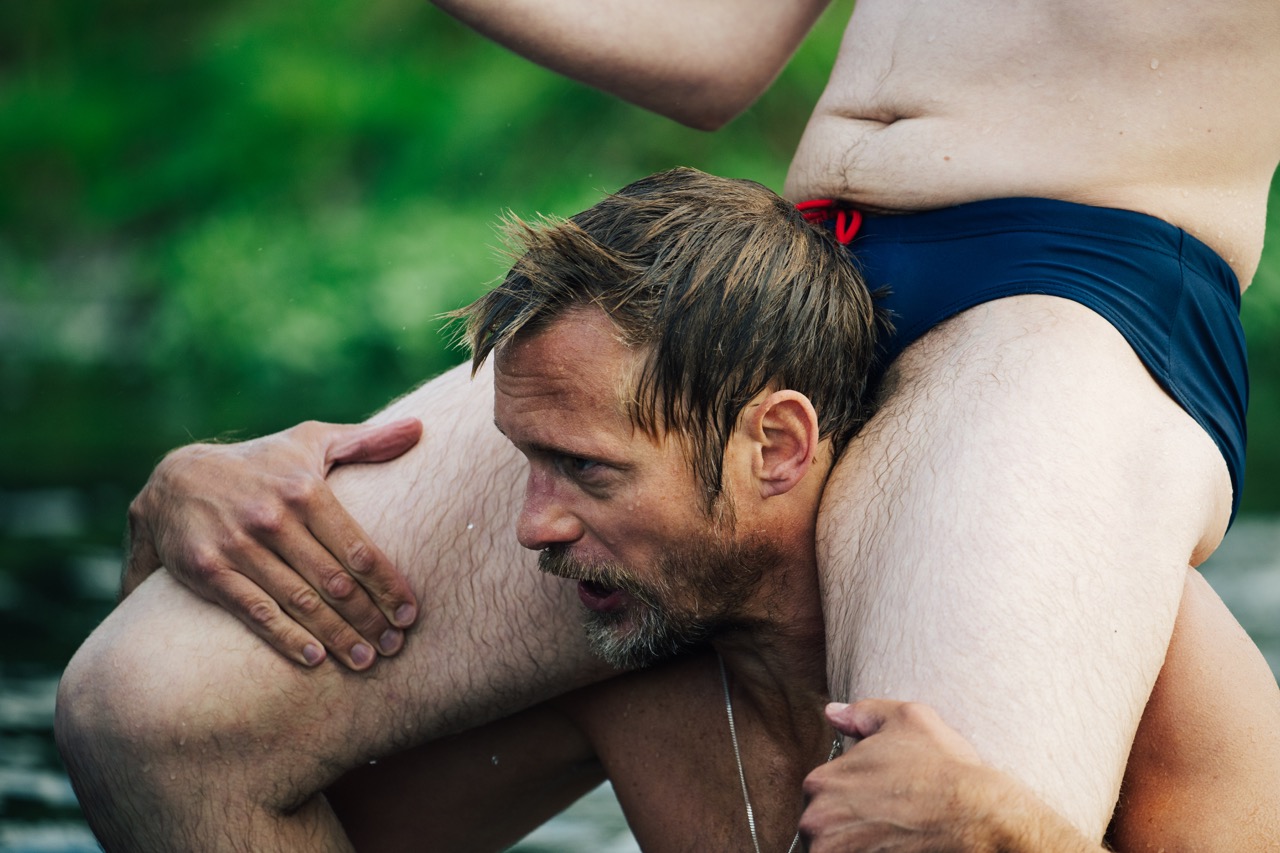
Pillion (2025), directed by Harry Lighton
LR: How did you think about the visuals? It has quite an unintrusive visual language I would say.
HL: Well, I’m not sure if you’ve heard about this, but content dictates form.
LR: Wow. That’s amazing. Did you come up with that?
HL: Yes. I like stories where you aren’t aware of the camera and you kind of sink into the world of the film. Alfonso Cuarón’s Roma was the biggest visual inspiration for Pillion. There are a lot of scenes where Colin is essentially just watching and doing fuck all and that could be quite boring and you need the camera to provide the propulsion by gradually revealing information in the shot. Roma is two hours of [a woman] in a form of service, like Colin. So I pinched that from Cuarón.
LR: And I guess that’s why the whole thing is in Spanish.
HL: Yeah. That’s why when Ray cums he shouts “Olé!”
LR: Having the protagonist of your film be essentially quite shy must be quite tricky.
LR: Well, that’s why I was terrified that Harry Melling wasn’t going to say yes. As an actor, I think he’s unique in that he can be totally captivating while playing characteristics which are usually quite dull to watch—passivity or shyness. He can magnetize an audience while doing something which seems to be the antithesis of magnetism.
LR: It’s also a really funny film. It struck me as a rom com.
HL: People are calling it a domcom. Peter Bradshaw called it a BDSM Wallace and Gromit.
LR: I suppose there is sex in the film but none of those scenes are played purely to be hot. We never see Ray and Colin having amazing sex.
HL: Yeah we do, in the woods. Colin has a mindblowing orgasm on a table in the glorious sunlit woods. Is that not good enough?
LR: Maybe this is my conservatism talking, but when I said ‘amazing sex’ I think I was thinking about just them, in their flat, when they’re alone.
HL: I think that kind of sex would have an intimacy to it that would have pushed against Ray’s desire to keep intimacy out of the relationship. Whereas, there’s something about this happening in a group environment, where Colin feels disempowered for the whole day, and then Ray finally elevates him. It’s the equivalent of him being given the solo in Once in Royal David’s City in the Christmas Church Service.
LR: I found it manipulative, maybe. The lead up to that. Ray toying with Colin’s emotions.
HL: Yeah, he is being manipulative. But sometimes it’s hot to be manipulated.
LR: Totally. … Are you on Hinge?
Pillion is in cinemas now





